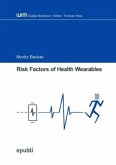Health wearables, such as smart watches, fitness tracker or wristbands arise from the intersection of healthcare, health informatics, and information systems. They are worn on the body as small digital devices with biometrical sensors to continuously generate personal health data and can be used without the need for health professionals.
These benefits lead to an increasing diffusion of health wearables and could be the basis for substantial transformations in entire industry sectors, such as the digitization of healthcare.
However, by continuously gathering personal and intimate data, specific risks arise for users of health wearables.This dissertation examines in four empirical studies different risk factors of health wearables.
From a theoretical perspective, this dissertation provides first insights into humans' complex decision-making process concerning privacy and health information risks in a high sensitive data environment of new emerging health ITs.
From a practical perspective it provides evidence how specific risks factors can be influenced and how these risks lead individuals to perceive the devices as a threat to their health and well-being. These findings help providers, managers and policy makers, who intend to encourage a healthy society through the proactive use of health wearables to focus on eliminating or reducing individuals' health and privacy risks to maintain an extended use.
These benefits lead to an increasing diffusion of health wearables and could be the basis for substantial transformations in entire industry sectors, such as the digitization of healthcare.
However, by continuously gathering personal and intimate data, specific risks arise for users of health wearables.This dissertation examines in four empirical studies different risk factors of health wearables.
From a theoretical perspective, this dissertation provides first insights into humans' complex decision-making process concerning privacy and health information risks in a high sensitive data environment of new emerging health ITs.
From a practical perspective it provides evidence how specific risks factors can be influenced and how these risks lead individuals to perceive the devices as a threat to their health and well-being. These findings help providers, managers and policy makers, who intend to encourage a healthy society through the proactive use of health wearables to focus on eliminating or reducing individuals' health and privacy risks to maintain an extended use.








